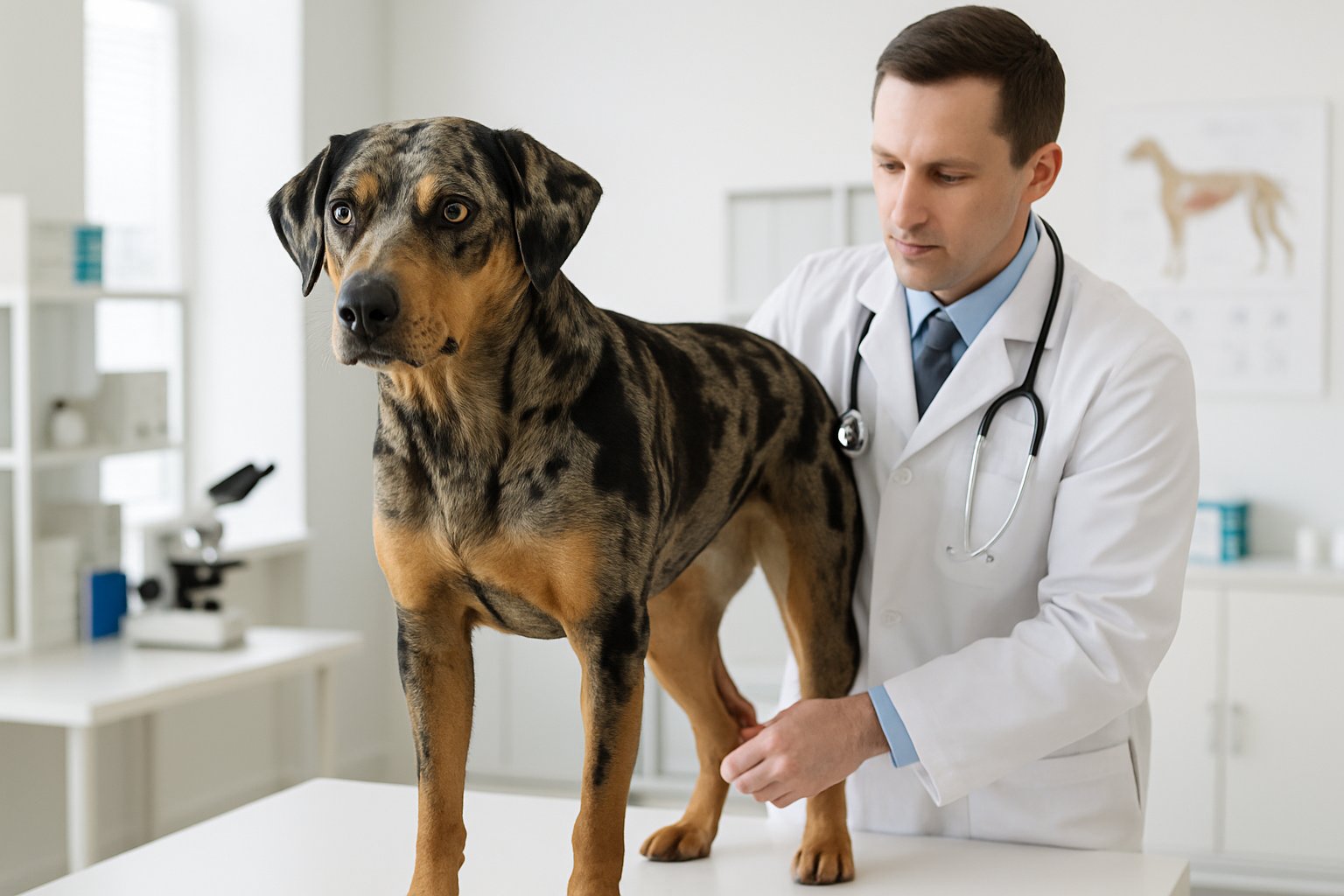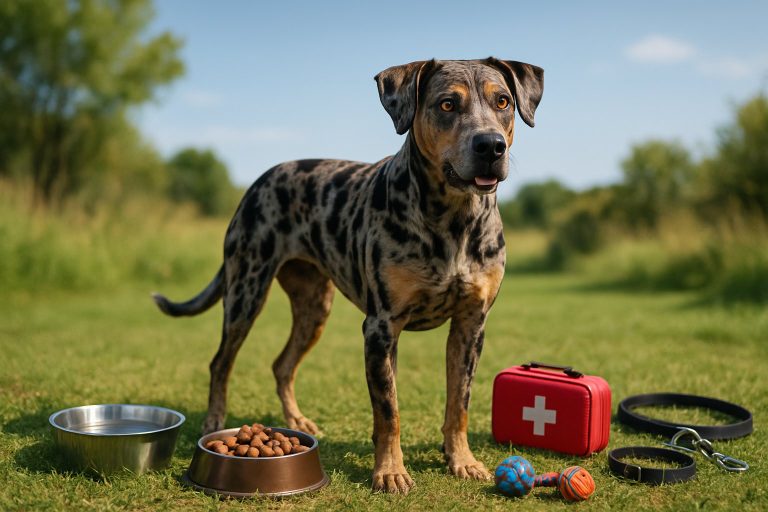Caring for your Catahoula Leopard Dog means paying attention to both their daily needs and their long-term health. These unique dogs are active, smart, and loyal, but they do best when you know how to keep them healthy and happy.
Understanding the most important ways to protect your Catahoula’s health can help you enjoy more good years together. Whether you are new to the breed or an experienced owner, these tips focus on helping your dog live its best life.
1. Regular hip dysplasia screenings
- Catahoula Leopard Dogs are prone to hip dysplasia. This is a genetic condition where the hip joint does not fit properly, which can cause pain and trouble walking.
- You should schedule regular screenings with your vet to check for hip dysplasia. These exams may include X-rays or other imaging to see if your dog’s hips are healthy.
- Early detection helps you manage hip dysplasia better. It allows you and your vet to create a care plan, which could include weight management, exercise changes, or medication.
- Staying aware of your dog’s joint health can lower the risk of long-term problems. Regular screenings are an easy way to help keep your Catahoula active and comfortable. Learn more about this issue and other common Catahoula health problems.

2. Routine hearing tests for early deafness detection
- Catahoula Leopard dogs are more likely than some other breeds to develop hearing problems. This is mostly linked to genetics, especially in dogs with a lot of white coloring. Early deafness can show up even in puppies, so it’s important to check their hearing as they grow.
- Routine hearing tests help you spot issues before they become serious. Regular checks can reveal gradual hearing loss that you might not notice at home. Early detection allows you to make changes to your dog’s environment and training if needed.
- Many experts recommend scheduling hearing tests as part of your dog’s yearly health exam. Vets can use special tools to test how your dog responds to sound. This helps catch problems early and protects your Catahoula Leopard’s quality of life.
- Staying alert to the signs of hearing loss is important, too. If your dog stops responding to noises or seems confused, it’s a good idea to mention it to your vet during routine checkups. Routine screenings, like those used in human health care, can help make sure hearing problems are addressed early.
3. Annual eye exams to monitor lens and retina health
- Catahoula Leopard Dogs can develop eye problems as they age. Some common issues include cataracts, retinal disease, and glaucoma. These conditions may not show obvious signs at first but can lead to vision loss if not found early.
- Taking your Catahoula for an annual eye exam helps catch these problems before they get worse. During the exam, a veterinarian checks the lens and retina for changes or damage. They might also test eye pressure to screen for glaucoma, which is a risk for this breed.
- Regular eye exams help protect your dog’s vision and detect issues early when treatment works best. Experts recommend yearly visits so your vet can spot changes over time and take action if needed. Learn more about why eye exams are important and how they help keep pets healthy.
- If you notice your Catahoula bumping into things or if their eyes look cloudy, schedule an exam right away. Early care is key for healthy eyes and a better quality of life for your dog.
4. Balanced diet rich in protein and healthy fats
- Your Catahoula Leopard needs a balanced diet to stay healthy and active. This breed is known for its high energy, so their meals should include enough nutrients to support their lifestyle.
- Include quality animal proteins like chicken, turkey, beef, or fish as the main part of each meal. These proteins help build and repair muscle, which is important for active dogs.
- Healthy fats are also important. Sources like fish oil or chicken fat help keep your dog’s skin and coat in good condition. Fats also give your dog energy throughout the day.
- Add some complex carbohydrates from vegetables and whole grains to provide fiber and additional vitamins. Avoid cheap fillers or foods high in artificial additives, which are not good for dogs.
- Always make sure fresh water is available. A healthy diet and proper hydration help your Catahoula Leopard stay strong and thrive. For more information on balanced diets for pets, see advice on providing essential nutrients and choosing the right mix of foods.
5. Daily exercise to manage high energy levels
- Catahoula Leopard Dogs have a lot of energy. They need daily exercise to stay healthy and avoid problem behaviors. Long walks, runs, or active playtime are important to keep your dog fit and happy.
- This breed was developed to work all day. Without enough activity, your Catahoula may become bored or restless. Boredom can lead to chewing, digging, or barking.
- Experts recommend regular physical and mental challenges for Catahoulas. Games like fetch or agility training are good options. Giving your Catahoula jobs or tasks can also help meet their need for mental stimulation.
- Providing enough exercise supports your dog’s heart, muscles, and joints. It also helps prevent obesity. Owners often find that a tired Catahoula is well-behaved and calmer at home.
- Many owners note that Catahoulas are not suited for apartment life without plenty of outdoor time. Most thrive in homes with large yards or access to open spaces. If you can meet their exercise needs, Catahoulas can be loyal and well-adjusted pets.
6. Avoid excessive sun exposure to protect merle coat skin
- Catahoula Leopards with merle coats are more sensitive to sunlight. Their lighter, patchy fur often means areas of skin have less natural protection. This can increase the risk of sunburn and irritation, especially during long periods outdoors.
- Try to keep your dog in shaded areas when the sun is strong. Walks and playtime are safest in the early morning or late afternoon when sunlight is less intense.
- Consider using pet-safe sunscreen on light or thin-furred areas if your dog has to be outside for longer periods. Focus on spots like the nose, ears, and belly, which tend to be more exposed.
- Regularly check your dog’s skin for any signs of redness, dryness, or peeling after time in the sun. Early signs of sun damage are easier to treat.
- Healthy sun habits help lower the risk of skin problems and keep your Catahoula Leopard’s coat in good condition. The Centers for Disease Control and Prevention have additional tips about sun safety for pets and people.
7. Maintain a consistent vaccination schedule
- Vaccinations protect your Catahoula Leopard Dog from serious diseases. Routine shots, like those for rabies, distemper, and parvovirus, lower the risk of illness and help your dog live a healthier life.
- Puppies need vaccines at set ages, usually starting at six to eight weeks old. Adult dogs require booster shots to keep their immunity strong. Your veterinarian can recommend the right vaccination schedule based on your dog’s age and health.
- Missing or delaying vaccines can leave your dog exposed to preventable illnesses. Stay organized with reminders so your Catahoula never misses an important shot. Regular checkups also give your vet a chance to spot any health issues early.
8. Use joint supplements like glucosamine and chondroitin
- Catahoula Leopard Dogs are active and energetic. Their busy lifestyle can put stress on their joints, especially as they get older.
- Joint supplements such as glucosamine and chondroitin may help support cartilage and joint health. These ingredients are often used to help manage stiffness or mild pain in active or aging dogs.
- Some studies suggest these supplements might decrease inflammation and support the repair of joint cartilage. They are popular options for helping dogs maintain comfortable movement and mobility.
- Veterinarians sometimes suggest adding glucosamine and chondroitin to your Catahoula’s routine if you notice any signs of joint discomfort. To learn more about how these supplements may support joint function, visit Harvard’s page about glucosamine and chondroitin.
- Choose a supplement made for dogs, and follow dosing instructions carefully. If you are unsure, ask your vet for advice or recommendations before starting any new supplement.

9. Monitor weight to prevent obesity-related issues
- Keeping your Catahoula Leopard Dog at a healthy weight is important for their long-term health. Dogs that carry extra weight have a higher risk of joint problems, diabetes, and heart disease. Watch for signs like trouble running, breathing harder after exercise, or extra fat along the ribs.
- Routinely check your dog’s shape and feel around their ribs and waist. You should be able to feel their ribs without pressing hard, but they should not be too visible. Consider weighing your dog every few months to spot changes early.
- Feeding your Catahoula balanced meals and using measured food portions can help prevent accidental overfeeding. Treats should be given in moderation. Replace high-calorie treats with lower-calorie options or use some of your dog’s regular food as treats.
- Regular exercise is also key for this active breed. Daily walks, playtime, and mental activities help your dog use energy in a healthy way. If you need more tips, check out advice from sites like CDC Healthy Weight and Harvard Nutrition Source.
10. Early socialization to reduce behavioral stress
- Early socialization is important for your Catahoula Leopard Dog’s mental health. Introducing your dog to different people, pets, and places helps lower anxiety and stress in new situations.
- A well-socialized Catahoula often feels more relaxed during vet visits, walks, and when meeting strangers. This can help prevent fear-based reactions like barking, lunging, or hiding.
- Positive experiences during puppyhood are best. Regularly exposing your dog to new sights and sounds builds their confidence and can make them more adaptable as adults.
- Good early socialization also reduces the risk of behavioral problems. It has been shown that starting socialization early plays a key role in shaping your Catahoula’s behavior and temperament, making them friendlier and easier to manage throughout their life. For more information, read about the importance of early socialization for this breed.
- Safe and guided interactions can set your Catahoula up for a happier, healthier life. Consistent, positive exposure will make stressful events easier to handle for both you and your dog.



